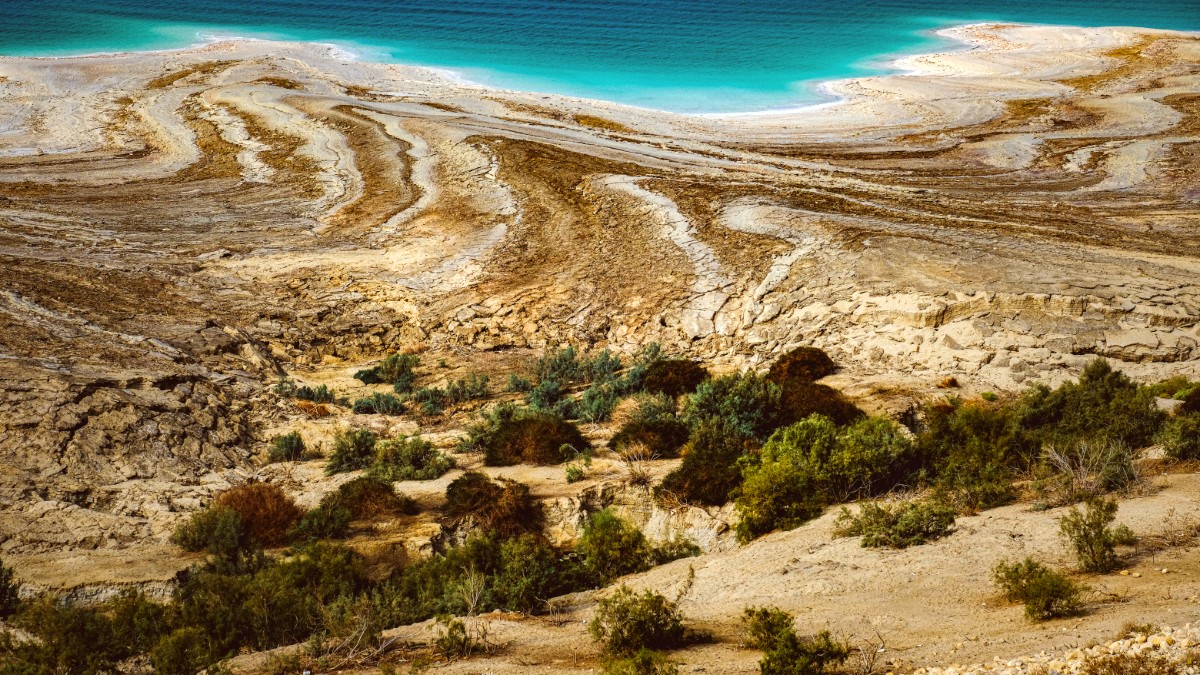
Israeli cuisine draws influences from Middle Eastern, Mediterranean, and various Jewish diaspora cuisines. It emphasizes fresh vegetables, fruits, legumes, grains, olive oil, and fish. Meats commonly include chicken, beef, and lamb. Dairy products are prominent.
Jordanian cuisine represents traditional Levantine cooking. Staples include bread, rice, lamb, chicken, and a variety of vegetables and lentils. It is known for its mezze (small appetizers) and slow-cooked meat dishes.
Olive oil, chickpeas, tahini (sesame paste), garlic, lemon, fresh herbs (parsley, mint, cilantro), and spices like cumin, coriander, za'atar (thyme and sesame blend), and sumac.
You will often find yogurt, cottage cheese, fresh salads (like the finely chopped Israeli salad), pomegranates, and dates.
Jameed (fermented dried yogurt, useful for mansaf), freekeh (roasted green wheat), and cardamom (often used in coffee).
Creamy chickpea dip and deep-fried chickpea patties. Ubiquitous and affordable street food throughout the region.
Widely available in both Israel and Jordan.
Eggs poached in tomato sauce; thinly sliced meat in pita. Popular breakfast/brunch and street food staples.
Find shakshuka in cafes; shawarma on almost any street.
Lamb in fermented yogurt sauce (Mansaf); roasted chicken with sumac on bread (Musakhan).
Mansaf in Madaba/Amman; Musakhan in local eateries.
Freshly squeezed juices (orange, pomegranate), strong Turkish coffee, and refreshing mint tea are popular. Local beers (Goldstar, Maccabee in Israel; Amstel, Petra in Jordan) are available. Alcohol availability is more restricted in Jordan, especially outside tourist areas and luxury resorts.
Dates from the Jordan Valley plantations, these are specifically sweet and nutritious. Seasonal fruits like figs, grapes, and prickly pears are delicious. Halva, a dense, sweet confection made from tahini (sesame paste).
Fine dining found within luxury resorts on both sides of the Dead Sea. Offers international and elevated local specialties in a sophisticated atmosphere.
Standalone mid-range restaurants are limited at resort strips. Broader selection in nearby towns like Arad (Israel) or Madaba (Jordan).
Markets and food halls are not present at the Dead Sea. Resort hotels provide varied international cuisine to suit diverse guests.
Widely available, especially in Israel, where vegetarianism and veganism are common lifestyle choices. Hummus, falafel, various salads, and vegetable stews are staples that naturally fit these diets.
Many restaurants, especially in Israel, clearly mark vegetarian and vegan dishes on their menus. In Jordan, vegetarian options are also plentiful due to the plant-based nature of many traditional mezze dishes.
Halal is predominant in Jordan. Most meat served in restaurants and hotels is Halal, adhering to Islamic dietary laws.
Most hotels and many restaurants in Israel, especially in resort areas like the Dead Sea, are Kosher-certified. Look for the Kosher certification symbol, which indicates adherence to Jewish dietary laws (e.g., no mixing of meat and dairy, specific slaughter practices).
Awareness of gluten-free and allergen requirements is increasing in both countries.
Larger hotels accommodate specific dietary restrictions when needs are clearly communicated in advance.
Carry a Translation card for allergies to ensure clear communication with staff.
Online forums, travel blogs, or apps like HappyCow provide useful information and recommendations.
No major food festivals are unique to the Dead Sea itself. Larger cities in Israel and Jordan host food festivals throughout the year, celebrating local produce and traditional dishes.
Check local event calendars during your travel dates. Seasonal and festival foods vary during religious holidays. Ramadan in Jordan features Iftar meals to break the fast.
Dining at the Dead Sea mainly centers around resort dining. This often means large buffet-style meals, necessitated by the isolated nature of the area and the need to cater to many guests.
Some resorts may offer themed dinner nights or special culinary events, but these are typically within the resort's existing restaurant framework.
The main culinary concept here is the convenience and breadth of selection offered within the hotel environment.
The large resorts at the Dead Sea generally provide a variety of international cuisines to cater to their diverse guest base.
Art, craft, music, or dance workshops are not widely available at the Dead Sea.
Not typically offered directly at the Dead Sea resorts.
Opportunities for farm visits or tours of food producers are limited in the immediate vicinity due to the arid environment.
Dining at the Dead Sea mainly centers around resort dining. This often means large buffet-style meals, necessitated by the isolated nature of the area and the need to cater to many guests.
The main culinary concept here is the convenience and breadth of selection offered within the hotel environment.
Some resorts may offer themed dinner nights or special culinary events, but these are typically within the resort's existing restaurant framework.
This supplements the standard buffet options.
If seeking authentic local cuisine, plan excursions to nearby towns and cities during your visit.
During religious holidays, food availability and restaurant hours may vary, especially outside of resorts.
The culinary scene in the Dead Sea area is predominantly tied to the resort experience. Venture out for authentic local flavors.